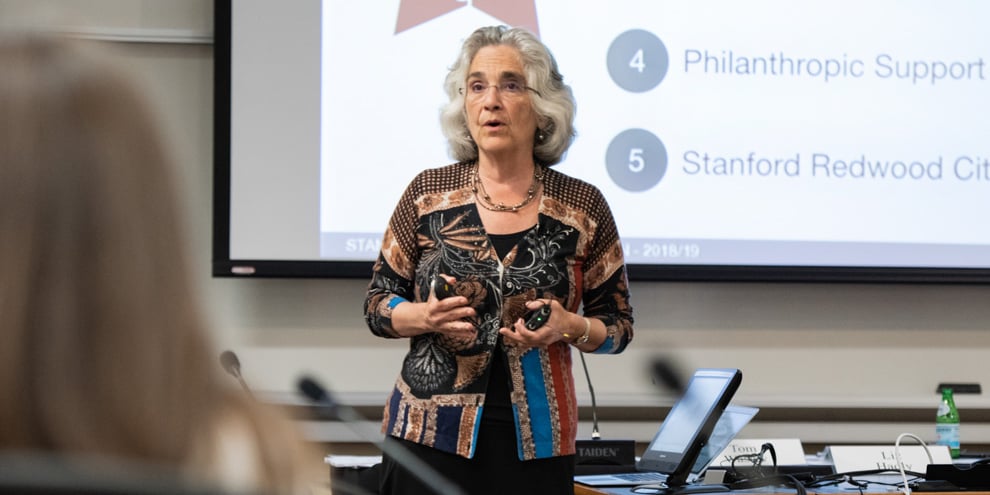At its Thursday meeting, the Faculty Senate heard presentations on the University’s budget for the upcoming academic year, as well as efforts to improve faculty diversity.
The Faculty Senate unanimously passed a change allowing the chair of the Stanford University Postdoctoral Association to participate in Senate functions. The postdoctoral student representative will have a reserved seat and speaking rights at future meetings.
Reporting on faculty gains and losses this year, Senior Associate Vice Provost of Faculty Development and Diversity Matthew Snipp addressed opportunities to advance the racial and gender diversity of Stanford faculty — and challenges related to the initiative.
With respect to gender diversity, Snipp said that the University “has moved the needle a little bit” over the last 10 years.
Looking at the cohort of hires in the 10-year period, Snipp said that 202, or 53 percent, are women. Of the 2,205 total faculty members, 29 percent are women.
“We’ve got a lot of work to do, but we have made some progress,” Snipp said.
Advancing racial diversity among Stanford faculty, Snipp said, has been a slower initiative.
At present, according to Snipp, 25 percent of the faculty are minorities. 18 percent identify as either Asian or Asian and white. 7 percent identify with underrepresented minority groups, including American Indians, African-Americans, Hispanic and Hawaiian or Pacific Islander.
In the cohort of faculty hires over the last 10 years, only 10 percent of the remaining group are in the UMG category.
Provost Persis Drell announced the expansion of the faculty diversity incentive program.
Beginning next year for five of Stanford’s seven schools, the appointment of a faculty member “who brings much needed diversity, broadly defined, may entitle the school to a full incremental billet, fully funded,” Drell said.
A billet is a term used in Stanford’s budgeting to refer to a position. Drell said that further details about the program are forthcoming.
The School of Medicine and Graduate School of Business will not participate in this program, as they do not receive operating budget support from the Provost.
Drell also provided an overview of the University’s 2018-19 budget. She said that the preparation of the budget was complicated this year because it was being conducted in tandem and in coordination with the long-term planning process.
Drell said that the budget increases financial support for four key areas of priority: diversity and inclusion, affordability, student financial aid, and shared research facilities and platforms. The budget increases funds for first-generation low-income students, provides support for recruitment of diverse faculty and funds minimum post-doctoral student salaries of $60,000.
Drell said that a new Affordability Task Force will work over the next six months to provide recommendations concerning additional investments in undergraduate financial aid. She also noted the continued challenges resulting from the high cost of housing in the area surrounding campus.
Provost Drell said that the University’s endowment grew by 6.5 percent over the past year. The endowment payout percentage — the portion of the endowment used to fund operating expenditures — increased to 3.1 percent, up from 1.6 percent last year.
However, Drell noted, the increase in payout percentage did not keep pace with the 4.9 percent growth in budgeted expenditures.
Overall, revenues grew by 3.3 percent to $6.5 billion, marking the first time the consolidated budget has reached that level. Expenses are budgeted for $6.2 billion, which is expected to yield a general fund surplus of roughly $15 million.
In addition, the Faculty Senate heard statements in support of memorial resolutions for deceased faculty members John W. Lewis, founder of the Center for East Asian Studies, and Michael Predmore, professor emeritus of Iberian and Latin American Cultures.
Contact Joe Dworetzky at duret ‘at’ stanford.edu.
